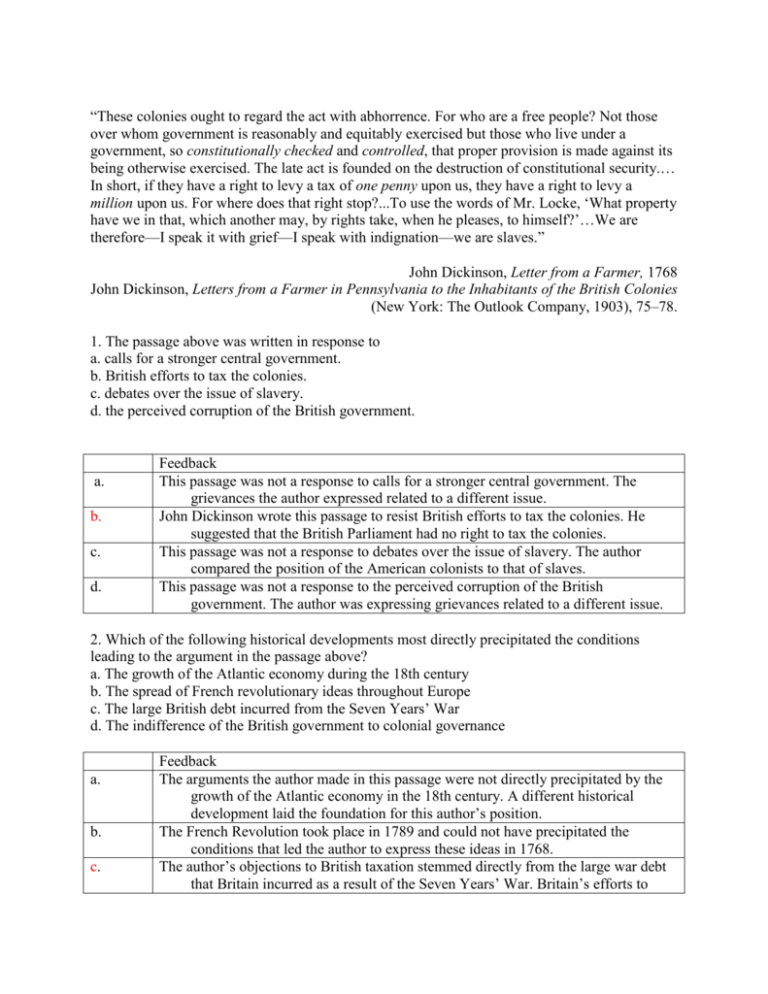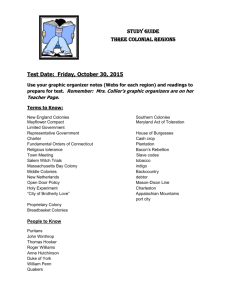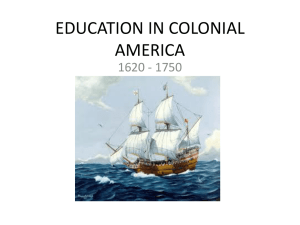MC Practice - Mater Academy Lakes High School
advertisement

“These colonies ought to regard the act with abhorrence. For who are a free people? Not those over whom government is reasonably and equitably exercised but those who live under a government, so constitutionally checked and controlled, that proper provision is made against its being otherwise exercised. The late act is founded on the destruction of constitutional security.… In short, if they have a right to levy a tax of one penny upon us, they have a right to levy a million upon us. For where does that right stop?...To use the words of Mr. Locke, ‘What property have we in that, which another may, by rights take, when he pleases, to himself?’…We are therefore—I speak it with grief—I speak with indignation—we are slaves.” John Dickinson, Letter from a Farmer, 1768 John Dickinson, Letters from a Farmer in Pennsylvania to the Inhabitants of the British Colonies (New York: The Outlook Company, 1903), 75–78. 1. The passage above was written in response to a. calls for a stronger central government. b. British efforts to tax the colonies. c. debates over the issue of slavery. d. the perceived corruption of the British government. a. b. c. d. Feedback This passage was not a response to calls for a stronger central government. The grievances the author expressed related to a different issue. John Dickinson wrote this passage to resist British efforts to tax the colonies. He suggested that the British Parliament had no right to tax the colonies. This passage was not a response to debates over the issue of slavery. The author compared the position of the American colonists to that of slaves. This passage was not a response to the perceived corruption of the British government. The author was expressing grievances related to a different issue. 2. Which of the following historical developments most directly precipitated the conditions leading to the argument in the passage above? a. The growth of the Atlantic economy during the 18th century b. The spread of French revolutionary ideas throughout Europe c. The large British debt incurred from the Seven Years’ War d. The indifference of the British government to colonial governance a. b. c. Feedback The arguments the author made in this passage were not directly precipitated by the growth of the Atlantic economy in the 18th century. A different historical development laid the foundation for this author’s position. The French Revolution took place in 1789 and could not have precipitated the conditions that led the author to express these ideas in 1768. The author’s objections to British taxation stemmed directly from the large war debt that Britain incurred as a result of the Seven Years’ War. Britain’s efforts to d. raise revenue by taxing the colonists provoked this author’s response. The author’s arguments did not stem from British indifference to colonial governance. The author suggested that Britain was too involved in colonial matters, not that it was inattentive. 3. Which group would most likely have supported the sentiments expressed in the passage above? a. Loyalists in the 1770s and 1780s b. Backcountry rebels in the 1780s and 1790s c. Whigs in the 1830s and 1840s d. Republicans in the 1850s and 1860s a. b. c. d. Feedback Loyalists would not have supported these sentiments. Loyalists remained loyal to the British Crown and resisted the arguments and actions of Patriots. Backcountry rebels in the 1780s and 1790s would most likely have supported the sentiments in the above passage. American yeomen continued to resist taxation they perceived as unfair, even when it was levied by independent American governments. Whigs in the 1830s and 1840s would not have been likely to agree with the sentiments John Dickinson expressed. Whigs in those decades supported a strong federal government and high tariffs to support the growth of American businesses. Republicans in the 1850s and 1860s would not have supported the sentiments in the above passage. Their priorities centered on the creation of a strong federal government and limiting the expansion of slavery into the territories. “In singing of hymns and spiritual songs—whereby their hearts are greatly inflamed with divine love and heavenly joy, and makes the Holy Ghost be shed abroad in their hearts. This is very fine talking. I could wish that all the doings were equally innocent.…But let us go on, and examine if in the general corruption of manners these New Lights have made any reform in the vice of drunkenness?...There is not one hogshead of liquor less consumed since their visiting us, or any tavern shut up—So far from it, that there has been a great increase of both.…Since the appearance of these New Lights more enormities of every kind have been committed—more robberies, thefts, murders, plunderings, burglaries, and villainies of every kind, than ever before…In short, they have filled the country with idle and vagrant persons, who live by their criminalities. For it is a maxim with these vermin of religion, that a person must first be a sinner e’re he can be saint.” Charles Woodmason, a traveling Anglican preacher, 1768 Richard J. Hooker, The Carolina Backcountry on the Eve of the Revolution: The Journal and Other Writings of Charles Woodmason, Anglican Itinerant (Chapel Hill: The University of North Carolina Press, 1953). 4. The excerpt above was most likely a response to a. Puritan efforts to create close-knit religious societies. b. the diminishing of regional distinctiveness over time. c. widespread Protestant evangelical religious revivals. d. mistrust between European leaders and American settlers. a. b. c. d. Feedback This excerpt was not a response to Puritan efforts to create close-knit religious societies. The Puritans engaged in those efforts in the 17th century, not the 18th century. This excerpt was not a response to the diminishing of regional distinctiveness in the American colonies over time. It reflected another issue. This excerpt is a response to the widespread Protestant evangelical religious revivals known as the Great Awakening. The author was critical of the revival, arguing that it had not changed the converts’ behaviors. This excerpt was not a response to the developing mistrust between European leaders and American settlers. It reflected a different issue. 5. The underlying cause of the author’s complaints in the passage above was a. social tensions among backcountry inhabitants. b. a strong belief in British racial and cultural superiority. c. the rise of indentured servitude and African slavery. d. resistance to British imperial control in the colonies. a. b. c. d. Feedback This author, an Anglican minister who likely preached in the southern colonies, was motivated in part by the social tensions that existed among the backcountry inhabitants of those regions. Most of the region’s elite belonged to the legally established Anglican Church, which tended to ignore the spiritual needs of landless whites. As Baptist “New Light” ministers converted the poor, they also threatened the legal and social authority of both Anglicans and Southern planters. This author’s complaints were not shaped by a strong belief in British racial and cultural superiority. The people whose behavior the writer condemned were no less British than he. The rise of indentured servitude and African slavery did not cause the complaints articulated by this author. His negative assessment was the result of a different set of factors. This author’s complaints did not emerge out of resistance to British imperial control in the colonies. His critique focused on issues that developed as a result of other factors. 6. The argument in the passage above was most similar to the criticisms of a. abolitionists towards Southern plantation owners in the 1840s and 1850s. b. nativists towards the influx of European immigrants in the mid-1800s. c. anti-imperialists towards the impact of expansionism in the early 1900s. d. conservatives towards the counterculture movement in the 1960s and 1970s. Feedback The criticisms in this passage do not resemble those abolitionists made of Southern plantation owners in the mid-19th century. Abolitionists criticized different elements of plantation owners’ lives. b. This author’s criticisms of “New Light” converts in the mid-18th century resemble those that nativist Americans made of European immigrants 100 years later. This Anglican minister attacked New Lights for their drinking, idleness, and criminality, just like nativists attacked Catholic Irish immigrants in the mid-19th century. c. This author’s critique of New Lights bears little or no similarity to anti-imperialists’ critique of expansionism at the end of the 19th century. d. This author’s criticisms of “New Light” converts bears some similarity to conservatives’ attacks on the counterculture in the mid-20th century, but it has more in common with one of the other options presented here. Conservatives argued that the counterculture had created the behaviors they criticized; this author expressed the belief that religion had failed to change the bad behavior in which these people had long engaged. “I need not inform you that a Majority of our Assembly is composed of Lawyers, Clerks, and others in Connection with them.…We have not the least Reason to expect the Good of the Farmer, and consequently of the Community, will be consulted by those who hang on Favor, or depend on the Intricacies of the Laws.…What is the Remedy against this malignant Disease? I will venture to prescribe a sovereign one if duly applied; that is, as you have now a fit Opportunity, choose for your Representatives or Burgesses, such Men as have given you the strongest Reason to believe they are truly honest: Such as are disinterested, public spirited, who will not allow their private Advantage once to stand in Competition with the public Good.” a. Herman Husband, a North Carolina Regulator, 1779 Herman Husband, An Impartial Relation of the First and Causes of the Recent Differences in Public Affairs Etc. (North Carolina, 1780). 7. Which of the following most directly contributed to the sentiments expressed in the letter above? a. British attempts to consolidate imperial control b. Social and economic inequalities in colonial society c. Political debates caused by the spread of French revolutionary ideas d. The role of colonial elites in fueling revolutionary sentiment a. b. Feedback The sentiments expressed in this letter were not the result of British attempts to consolidate imperial control. The author was expressing his opinions about a different set of issues. The sentiments expressed in this letter were a manifestation of social and economic inequalities in colonial society. In particular, they reflected the concerns of Carolina farmers who believed that the elite-led government was not representing their interests. c. d. The sentiments expressed in this letter were not the result of political debates caused by the spread of French revolutionary ideas. The letter originated in 1769, and the French Revolution did not occur until 20 years later. The sentiments expressed in this letter were not a response to the role played by colonial elites in fueling revolutionary sentiment. The letter was shaped by a different set of issues. 8. The sentiments expressed in the letter above foreshadowed later 18th-century a. calls for a stronger central government. b. backcountry social and ethnic tensions. c. fears about dangers of divisive political parties. d. difficulties over trade and foreign relations. a. b. c. d. Feedback The sentiments expressed in the letter do not anticipate later 18th-century calls for a stronger central government. The letter is not making an argument for stronger government. The sentiments expressed in the letter above foreshadowed the backcountry social and ethnic tensions that would emerge again later in the 18th century. In the 1780s and 1790s, backcountry farmers would again attempt to assert their rights as they fought the elite government for the right to migrate onto new western lands. The sentiments expressed in the letter do not foreshadow later 18th-century fears about the dangers posed by divisive political parties. The author is expressing his concerns about a different set of issues. The sentiments expressed in the letter do not foreshadow later 18th-century difficulties that arose over trade and foreign relations. The author is expressing his concerns about a different set of issues. 9. The arguments in the excerpt above were most similar to those of which later group? a. Nativists b. Social Darwinists c. Populists d. Modernists a. b. c. Feedback The arguments in the letter above bear little or no similarity to those expressed by nativists. The arguments in the above letter bear little or no similarity to those expressed by Social Darwinists. The sentiments expressed by Herman Husband in the 1769 letter are quite similar to those expressed by Populists in the late 19th century. Like Husband, the Populist movement argued that elites governed in their own interests and that their policies were harmful to small farmers in the United States. Populists sought to reform the government and to enact legislation that would protect farmers and workers. d. The arguments in the letter above bear little or no similarity to those expressed by modernists. ** This particular question is a perfect example of the types of questions I spoke to you about in class today… The question is asking you to compare to later groups. The Populist Party (movement) becomes a very influential independent political party in the 1890’s (aka Gilded Age/ Progressive Era)… Formed mostly by farmers, the Populist party appealed to the “common man” in times in which there was a lot of corruption in American politics due to the political machines and the spoils system… The poorer classes did not have a “voice” in politics… The Populist Party is formed (partially) as a result of this as well as by farmers who were attempting to get some of their needs met. We will discuss this in detail in later chapters… 1.During the mid-18th century, new pressures began to unite the British colonies, sparking an independence movement and ultimately a war against England. a. Briefly explain ONE political or economic pressure faced by the colonies during this time. b. Briefly explain ONE action taken by the colonists to address the pressure explained in Part A. c. Briefly explain ONE response by the British government to the action explained in Part B 2. Use your knowledge of United States history to answer parts A, B, and C. a. Briefly explain ONE social development in the 13 colonies between 1754 and 1775. b. Briefly explain ONE economic development in the 13 colonies between 1754 and 1775. c. Briefly explain the impact of the development explained in Part A or Part B on the United States between 1776 and 1800







